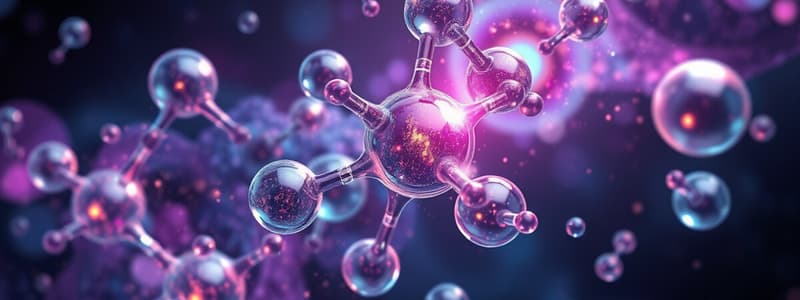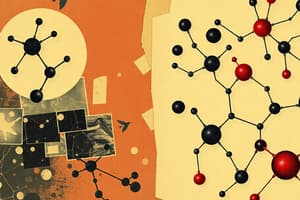Podcast
Questions and Answers
What is a molecule?
What is a molecule?
Smallest unit of a chemical compound composed of more than one atom.
What is a covalent bond?
What is a covalent bond?
The force that holds two or more atoms together by the sharing of a pair of electrons by two atoms.
What is a polar molecule?
What is a polar molecule?
A molecule with covalent bonds that has a partially positive and a negative side.
What is a mixture?
What is a mixture?
What is a solution?
What is a solution?
What is a solvent?
What is a solvent?
What is a solute?
What is a solute?
What is cohesion?
What is cohesion?
What is adhesion?
What is adhesion?
What is heat capacity?
What is heat capacity?
What does pH measure?
What does pH measure?
What is an acid?
What is an acid?
What is a base?
What is a base?
Flashcards are hidden until you start studying
Study Notes
Molecule and Related Definitions
- Molecules are the smallest units of chemical compounds, consisting of more than one atom.
- Covalent bonds occur when atoms share pairs of electrons, forming a strong connection.
- Polar molecules have covalent bonds and exhibit partial positive and negative charges, leading to unique properties.
- Mixtures consist of two or more substances that are physically combined but not chemically bonded.
- Solutions are homogeneous mixtures of two or more substances, where one component is typically a liquid, often referred to as a solvent.
- Solvents are liquids that dissolve solutes to create solutions, essential in various chemical processes.
- Solutes are the solids or substances that dissolve in a solvent to form a solution.
Properties of Molecules
- Cohesion refers to the attraction between identical molecules, aiding in the formation of liquid droplets and surface tension.
- Adhesion describes the attraction between different types of molecules, important for processes like capillary action.
- Heat capacity measures the amount of heat required to raise a substance's temperature, influencing temperature regulation in biological systems.
Acid-Base Chemistry
- The pH scale indicates a solution's acidity, with lower values signifying higher acidity levels.
- Acids are compounds that release hydrogen ions (H⁺) when dissolved in water, affecting pH levels.
- Bases produce hydroxide ions (OH⁻) in solutions, contributing to alkalinity.
Studying That Suits You
Use AI to generate personalized quizzes and flashcards to suit your learning preferences.




